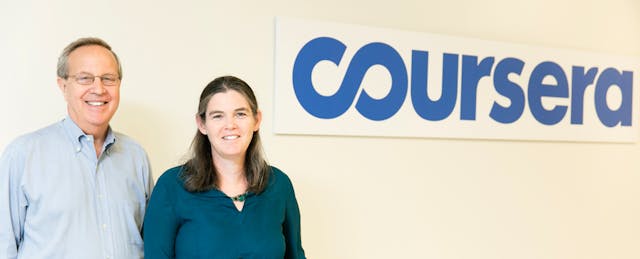The company once charged with “disrupting” American higher education has set its sights across the Pacific Ocean. And it has enticed plenty of schools—and companies—around the world to join its mission.
Coursera, a provider of massive open online courses, now boasts over 1,100 courses from 121 universities, about half of which are outside the US. And roughly three-quarters of the 15 million students it serves are from outside the country, says the company’s chief executive, Rick Levin.
To fuel its growth, Coursera has raised $49.5 million in a nearly-completed Series C round led by New Enterprise Associates, one of the company’s original backers. Other existing investors are returning, including Kleiner Perkins Caufield & Byers, International Finance Corporation, GSV Asset Management and Learn Capital. The round has a new investor, Times Internet, which operates the Times of India and other media assets.
The company expects to secure another $11.5 million sometime in early fall, which means this round will reach $60 million and put the company’s fundraising total at $145 million. Levin is confident the money is on the way, telling EdSurge that some investors “needed more time before publicly committing.”
“We’re revolutionizing what it means to have access to a university education,” Levin tells EdSurge. His numbers tell the tale: only about 20 percent of Coursera’s US-based learners are of high-school or university age. “The rest are over [age] 22,” he says, “with a large concentration in their late 20s and early 30s.” Across all users, Levin says there’s a split between those who want to develop career-building skills, and lifelong learners who are satiating their personal curiosities.
Expanding Coursera’s offerings to international students will be a priority for the company’s growth trajectory, particularly in Asia. “One of the big uses of this funding will be to ramp up our translation and localization of content,” says Levin. Already, the company has partnered with 10 universities across “greater” China (which includes the mainland, Hong Kong and Taiwan) to produce nearly 140 Chinese-language courses.
The company’s China connection isn’t surprising; Dhawal Shah, founder and CEO of Class Central, a directory for online courses, recounted Levin’s history of building partnerships with Chinese politicians and universities, dating back to his time as president of Yale University.
India is another target market. Like China, the country is struggling with double-digit unemployment rates among recent university graduates. In each country, Levin reports over one million Coursera users, many of whom take career-oriented courses. He’s optimistic that his newest investor, the Times Internet, will market Coursera courses across its different print and digital channels and “see a terrific spike in usage in India.”
Coursera is hailed as one of the “Big Three” MOOC providers, alongside Udacity and edX, all of which were founded within months of one another in 2012. Unlike Udacity, which has eschewed universities and now works exclusively with companies to build courses geared for technology jobs, Coursera still believes in the brand of universities and expertise of their faculty.
Still, Coursera is also wooing industry employers through its Global Skills Initiative, where companies sponsor courses created by universities that focus on high-demand skills. Levin assures “the university is still in control of the content,” and participation from company representatives is limited to guest lectures and applied projects. Any funding provided by companies goes to defray the cost that universities normally bear in creating the course, he says, adding that Coursera “gets no revenue from the businesses” participating in this program.
For Levin, this is his second time in charge of a major online learning operation. He was previously chairman of AllLearn, an online education partnership between Yale, Oxford and Stanford founded in 2001 (and reportedly backed by $12 million in private funding). It folded in 2006, citing financial difficulties and low enrollment for its non-credit-offering classes.
The difference today, Levin says, is that “the technology is ready for the concept.” In addition to better bandwidth and course interactivity, Levin adds that today’s online learning environment benefits from a new market for certifications that are backed by universities and recognized by employers. Coursera currently offers 36 “Specializations” for skills ranging from bioinformatics to business, and is expected to more than double these offerings in the coming weeks.
The growing acceptance of digital certificates represent an “innovation in the labor market,” says Levin. “It’s a virtuous cycle….the more that businesses recognize them, the more learners will post and share and drive demand.” The cost of Specialization certificates vary according to the number of courses required, and currently range from $147 (for cloud computing) to $470 (data science). Coursera splits revenues from verified certificates and Specializations with the schools that create the courses.
Levin declined to disclose how many users have paid for a Specializations course, only noting that completion rates for these courses are “more than double” that for regular courses.
Regardless of who awards the certifications or designs the courses, it’s becoming clear that building a pipeline between online learning to employment is key to any business model for MOOC providers. Levin is confident that the company will be profitable by 2019, a promise made back in 2014.
Coursera currently numbers roughly 180 employees, most of whom are based in its headquarter in Mountain View, CA. Several others are based in China and India to help the company grow its footprint.


